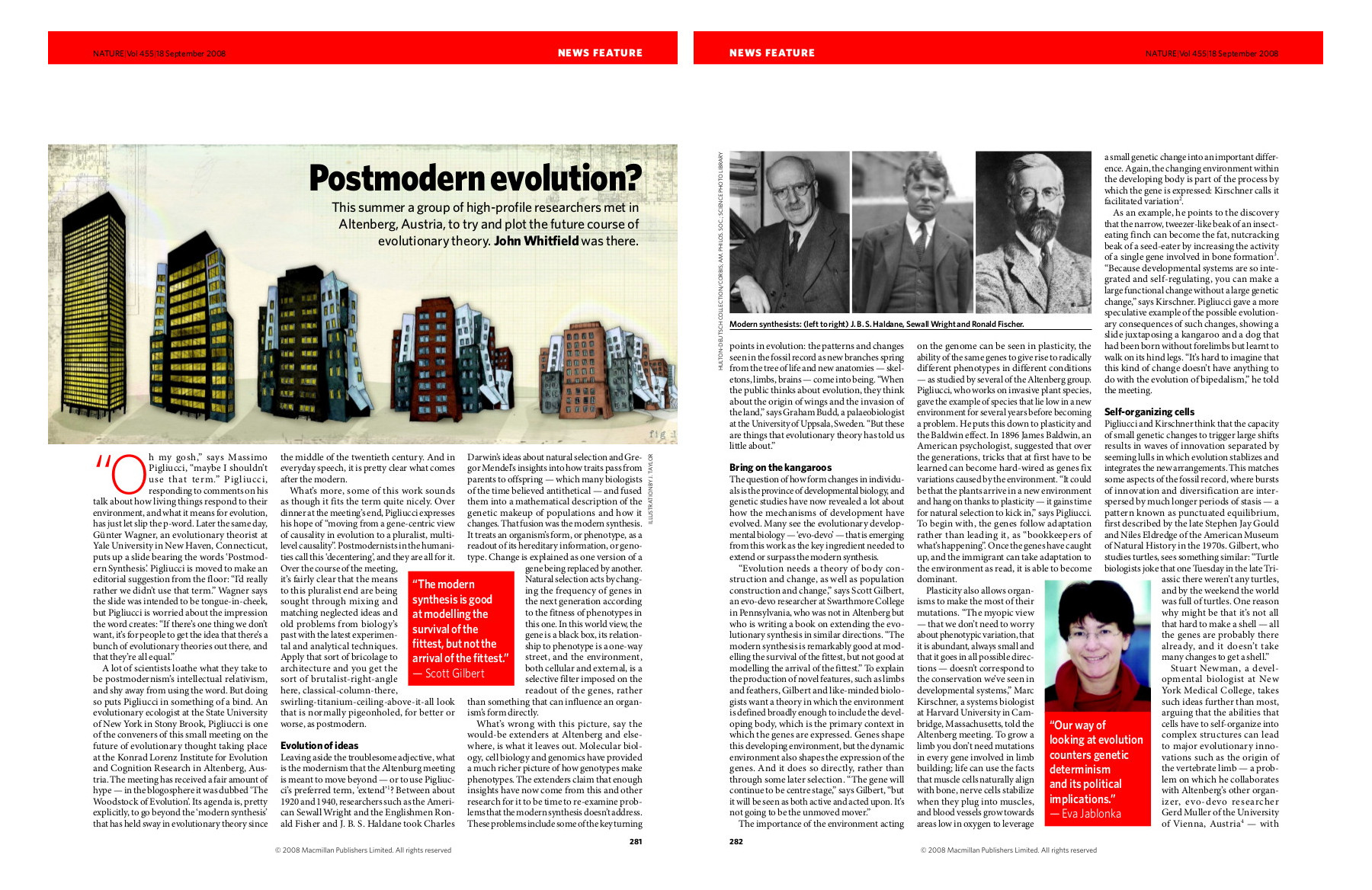Neo-Darwinism
Lies, damned lies, and biostatistics
Neo-Darwinism is Darwinian evolution through natural selection mixed with Mendelian genetics. It is also called the modern evolutionary synthesis and it is largely based on biostatistics.
Wikipedia - Biostatistics
Biostatistical modeling forms an important part of numerous modern biological theories. In the early 1900s, after the rediscovery of Gregor Mendel's Mendelian inheritance work, the gaps in understanding between genetics and evolutionary Darwinism led to vigorous debate between biometricians, such as Walter Weldon and Karl Pearson, and Mendelians, such as Charles Davenport, William Bateson and Wilhelm Johannsen. By the 1930s, statisticians and models built on statistical reasoning had helped to resolve these differences and to produce the neo-Darwinian modern evolutionary synthesis. The three leading figures in the establishment of population genetics and this synthesis all relied on statistics and developed its use in biology. Ronald Fisher... Sewall Wright... J. B. S. Haldane... These and other biostatisticians, mathematical biologists, and statistically inclined geneticists helped bring together evolutionary biology and genetics into a consistent, coherent whole that could begin to be quantitatively modeled.*
H. Allen Orr - The Genetic Theory of Adaptation: A Brief History
... despite the larger victory of Mendelism - the micromutationist view won out among evolutionists by about 1930. To a considerable extent, this victory reflected the efforts of Ronald Fisher, a founding father of population genetics and a tireless champion of Darwinian gradualism. Fisher successfully fused micromutationism with Mendelism, producing a mathematical framework known as the infinitesimal model.
So because true science did not provide any evidence for their belief in macroevolution the hardnosed evolutionists added statistics to their equation. Some key evolutionists involved in this practice were Karl Pearson who contributed to theories like very anti-social social Darwinism, Walter Weldon, a fanatic naturalist, and Ronald Fisher who was a fanatic proponent of eugenics and a fanatic naturalist.
Ronald Fisher - Retrospect of the Criticisms of the Theory of Natural Selection
It was Darwin's chief contribution, not only to Biology but to the whole of natural science, to have brought to light a process by which contingencies a priori improbable, are given, in the process of time, an increasing probability, until it is their non-occurrence rather than their occurrence which becomes highly improbable. ... The million, million, million ... to one chance happens once in a million, million, million ... times no matter how surprised we may be that it results in us.
Ronald Fisher venerated Father Time and invented a mathematical model based on assumptions which could be tweaked to fit with his belief. He is nicknamed a "convinced Darwinian"* who is of course hailed by modern-day fanatic evolutionists and atheists like Richard Dawkins who call himthe greatest biologist since Darwin**.
Fisher was mentored by Leonard Darwin* who also was a eugenicist. Not surprisingly, he got the Darwin Medal in 1948 from his fellow Darwinists at the Royal Society, a very powerful mainstream science organization which of course heavily promotes Darwinism. Cambridge College honoured eugenicist Fisher with a window. After activists sprayedeugenics is genocide – Fisher must fallon its wall Cambridge College reacted with a statement:The college is now aware of the views and actions of RA Fisher in a way that was not fully appreciated in 1989.** What a joke.
Reality
Egbert Giles Leigh, Jr. - The modern synthesis, Ronald Fisher and creationism
The 'modern evolutionary synthesis' convinced most biologists that natural selection was the only directive influence on adaptive evolution. Today, however, dissatisfaction with the synthesis is widespread, and creationists and antidarwinians are multiplying. The central problem with the synthesis is its failure to show (or to provide distinct signs) that natural selection of random mutations could account for observed levels of adaptation.*
Hintz et al. - Catching a ‘hopeful monster’: shepherd's purse (Capsella bursa-pastoris) as a model system to study the evolution of flower development
How fundamental innovations (or novelties) originate in evolution remains one of the most enigmatic questions of biology. According to the proponents of the Synthetic Theory, the gradual process of evolution by natural selection that operates within populations and species also creates the unique traits recognizable at higher taxonomic levels, meaning that macroevolution is just microevolution extended over relatively long periods of time. However, it has been repeatedly pointed out that innovation is different from adaptation, and that the Synthetic Theory, which is largely based on population genetics, falls short of explaining innovations, novelties, and the evolution of body plans.
H. Allen Orr - The Genetic Theory of Adaptation: A Brief History
There are in fact two problems. The first is that current theory is limited in several ways - all the models that have been mentioned rest on important assumptions and idealizations... The second problem concerns testability.
In reality these mathematical theories show that there is no biological evidence and that fanatic evolutionists do everything to keep their fantastic evolution faith alive. It is part of paradigm paralysis in which evolutionary pseudoscience is placed above true science and observable reality.
Extended evolutionary synthesis

Wikipedia - Extended evolutionary synthesis
The extended evolutionary synthesis is a set of extensions of the earlier modern synthesis of evolutionary biology that took place between 1918 and 1942. The extended evolutionary synthesis was called for in the 1950s by C. H. Waddington, argued for on the basis of punctuated equilibrium by Stephen Jay Gould and Niles Eldredge in the 1980s, and relaunched in 2007 by Massimo Pigliucci. The extended evolutionary synthesis revisits the relative importance of different factors at play, examining several assumptions of the earlier synthesis, and augmenting it with additional causative factors.*
Kevin Laland et al - Does evolutionary theory need a rethink?
Charles Darwin conceived of evolution by natural selection without knowing that genes exist. Now mainstream evolutionary theory has come to focus almost exclusively on genetic inheritance and processes that change gene frequencies. Yet new data pouring out of adjacent fields are starting to undermine this narrow stance. An alternative vision of evolution is beginning to crystallize, in which the processes by which organisms grow and develop are recognized as causes of evolution. Some of us first met to discuss these advances six years ago. In the time since, as members of an interdisciplinary team, we have worked intensively to develop a broader framework, termed the extended evolutionary synthesis1 (EES), and to flesh out its structure, assumptions and predictions. In essence, this synthesis maintains that important drivers of evolution, ones that cannot be reduced to genes, must be woven into the very fabric of evolutionary theory.*
There is yet again a call for a new evolutionary synthesis simply because the neo-Darwinian synthesis is not holding up. The extended evolutionary synthesis, also called Evo-Devo, is meant totake evolutionary theory beyond the boundaries of the Modern Synthesis.**
First of all this confirms that neo-Darwinism is insufficient for explaining the complexity of life. This is what many critics of evolution theory pointed out long before. But they were heavily suppressed or censored by the world of evolution-infested mainstream science and therefore most people don't know much about the problems with evolution theory.
Secondly, evolutionists are inventing more and more evolutionary theories to explain away the many problems. A good example is punctuated equilibrium which contradicts phyletic gradualism. This typifies evolution theory. The division within the world of evolution shows that macroevolution is far from explained and that, while the reality and truth of life remained constant, the thing that certainly evolved with time is evolution theory itself.
Anya Plutynski - What was Fisher's fundamental theorem of natural selection and what was it for?
L.A. Callender - Gregor Mendel: An Opponent of Descent with Modification
Stanley N. Salthe - Natural Selection in Relation to Complexity
Stanley N. Salthe - Analysis and critique of the concept of Natural Selection (and of the neoDarwinian theory of evolution)
Regina Nuzzo - Scientific method: Statistical errors
Paul Handford - A Brief History of Evolutionary Genetics (Part 2: Sir Ronald Fisher) *
Sean D. Pitman - Defining Evolution and its Boundaries *
